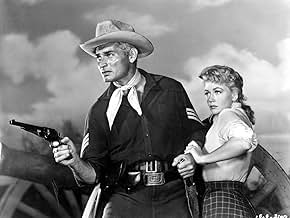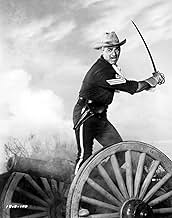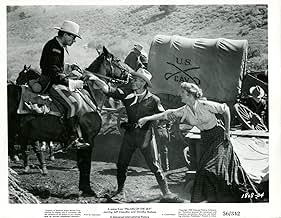IMDb-BEWERTUNG
6,2/10
819
IHRE BEWERTUNG
Als die Armee 1868 in Oregon gegen den Vertrag verstößt, indem sie eine Straße durch das Reservat baut, beschließen mehrere Stammeshäuptlinge, ihre Kräfte gegen die eindringenden Weißen zu v... Alles lesenAls die Armee 1868 in Oregon gegen den Vertrag verstößt, indem sie eine Straße durch das Reservat baut, beschließen mehrere Stammeshäuptlinge, ihre Kräfte gegen die eindringenden Weißen zu vereinen.Als die Armee 1868 in Oregon gegen den Vertrag verstößt, indem sie eine Straße durch das Reservat baut, beschließen mehrere Stammeshäuptlinge, ihre Kräfte gegen die eindringenden Weißen zu vereinen.
Empfohlene Bewertungen
That scene,when the good doctor courts danger ,when he comes towards an army of angry bloodthirsty Indians ,strongly reminds you of that scene in "the war of the worlds" (1953) when Uncle Matthews ,the minister ,faces up to the Martians ,a Bible and a cross in his hands .But those Indians were supposed to be Christians whereas the ETs were not .Which would tend to show that religion does necessarily calm people down !Jeff Chandler is efficient as sergeant Bell but the love affair is totally bland and Dorothy Malone is totally wasted (hardly 10 lines to say in the whole movie)-she would win an AA for her next movie the famous "written on the wind" melodrama -.Some (Indian only) sadism in certain scenes.
Given the basically no-star cast and the fact that it came from Universal-International, it's understandable that you might think this would be just another run-of-the-mill "B" oater--and you'd be dead wrong. This first-rate western has several things going for it. The breathtaking Oregon locations have been beautifully captured by Harold Lipstein's expert Technicolor cinematography. The colors are lush, and the photography is so atmospheric you can almost feel the chill in your bones as the troops slog through the rugged mountain country. There are several rousingly staged and exciting action scenes, notably a somewhat lengthy sequence in which a wagon train loaded with troops cuts its way through a mass of charging Indians. The performances by a cast of veteran character actors--Lee Marvin in an early role (although his Irish brogue is a bit much), Keith Andes, Charles Horvath, Alberto Morin and Willis Bouchey, among others--are top-notch, Dorothy Malone is beautiful, Jeff Chandler gives a more authoritative (and animated) performance than he usually did and Ward Bond does an outstanding job as a caring and concerned missionary who doesn't want to see bloodshed on either side. The main thing the film has going for it, though, is the subject matter. Rather than having the usual Apaches or Comanches rampaging through the Southwest, the film is set in the Oregon mountain country, and the Indians are not superstitious savages but have been converted to Christianity by missionary Bond, and many in their religious zeal have given up their "animal" names and taken the names of Biblical figures (to further drive the point home, one soldier complains to Bond that, since he has "Christianized" the Indians, they have no qualms about attacking at night; "uncivilized" Indians never attacked at night for fear that if they were killed, their spirits would roam in the dark forever and never find peace). As far as I know, this particular facet of the Indian wars had never been tackled before or, for that matter, since. The story consistently holds your interest (although the triangle between Chandler, Malone and Andes tends to slow things down somewhat), the action scenes are terrific, the photography, as noted, is superb. A very worthy effort from veteran director George Marshall. Well worth your time.
This is the story of Sgt. Emmet Bell (Jeff Chandler) who found his weakness in the arms of another man's woman (Dorothy Malone) and his strength in the power of another man's God . In Oregon Country , 1868 , numerous tribes of Native Americans with Biblic and Evangelist names have been placed on a reservation north of the Snake River . Here a priest called Holden (War Bond) , has constructed a church , and many of the tribes have accepted Christianity and Christian names such as Samuel , Aaron , Abraham , Jacob ; in fact , the three Indian chiefs hold Christian names : Elias , Isaias and Zacarias . But the White Men are building a bridge that across the river to Indian territory to areas north . When the cavalry, under the command of Col. Stedlow (Willis Bouchey) and Capt. Tom Gaxton (Keith Andes) arrive they intend to make peace but the tribal chiefs feel their treaty has been violated . As the cavalry column advances into the reservation , Kamiakin (Michael Ansara) carries out razzias against the US Cavalry and settlements .
A-Universal-International-Picture gets Western action , shootouts , a triangular love story , breathtaking Indian raids on Yankees regiments and results to be quite entertaining . This moving movie is an epic portrait of the thrilling story about several tribal chiefs decide to unite their forces against the trespassing whites who open a road across the reservation and are building a bridge crossing their lands . It's a medium budget film with good actors , technicians , production values and pleasing results . At the ending , when takes place the Indian assault , possesses all the sweep , grandeur and noisy action of the greatest Westerns of an age long past . The picture contains spectacular charges of Indian riders , including an overwhelming final when the US soldiers are besieged at a church turned into a strongly defended fort . Nice acting from a great cast . As Jeff Chandler is good as a honorable and Cristian Sergeant who is in charge of maintaining order and attempts to keep the peace between US cavalry and Indians . Chandler gives stature to the role , providing sincerity and bravura . Chandler was famous , until his early death , for playing Indian chief Cochise , a dignified portrait well shown in : ¨Broken arrow¨ , ¨Battle of Apache Pass¨ and ¨Taza , son of Cochise¨ . Although Chandler also played all kinds of genres , such as : ¨Return to Peyton Place¨(drama) , ¨Flame of Araby¨ (adventure) , ¨Merrill's marauders¨ (wartime , in his last film) , until his early death at 42-year-old . Dorothy Malone as gorgeous and pleasant wife , proves to be a great actress , as usual . And support cast is frankly excellent , such as : Ward Bond , Keith Andes , Lee Marvin , Sydney Chaplin, Olive Carey and special mention for the veteran Willis Bouchey as well as Michael Ansara as violent Indian chief vowing to lead the tribes in battle against the encroaching white men . This exciting and stirring Western was beautifully photographed in Cinemascope , print in Technicolor by Harold Lipstein , Universal's ordinary cameraman. And an original and shining score from William Lava and Heinz Roemheld , though uncredited .
This motion picture was professionally directed by George Marshall in colorful style , though has a few flaws . He realized a great number of films , especially Westerns . His first Western was ¨Wild Gold¨(1934) and he subsequently directed ¨Destry rides again¨ with James Stewart and Marlene Dietrich in which years later he would make a remake titled ¨Frenchie¨ with Audie Murphy and Marie Blanchard . As George Marshal introduces hilarious elements and amusement in his Westerns , such as ¨Texas¨ , ¨Fancy pants¨, ¨Advance to the rear¨, and also directs Musical Westerns as ¨Red Garters¨ and ¨The second greatest sex¨ . Being particularly known for his co-direction of the epic Western ¨How the west was won¨ along with Henry Hathaway and John Ford .
A-Universal-International-Picture gets Western action , shootouts , a triangular love story , breathtaking Indian raids on Yankees regiments and results to be quite entertaining . This moving movie is an epic portrait of the thrilling story about several tribal chiefs decide to unite their forces against the trespassing whites who open a road across the reservation and are building a bridge crossing their lands . It's a medium budget film with good actors , technicians , production values and pleasing results . At the ending , when takes place the Indian assault , possesses all the sweep , grandeur and noisy action of the greatest Westerns of an age long past . The picture contains spectacular charges of Indian riders , including an overwhelming final when the US soldiers are besieged at a church turned into a strongly defended fort . Nice acting from a great cast . As Jeff Chandler is good as a honorable and Cristian Sergeant who is in charge of maintaining order and attempts to keep the peace between US cavalry and Indians . Chandler gives stature to the role , providing sincerity and bravura . Chandler was famous , until his early death , for playing Indian chief Cochise , a dignified portrait well shown in : ¨Broken arrow¨ , ¨Battle of Apache Pass¨ and ¨Taza , son of Cochise¨ . Although Chandler also played all kinds of genres , such as : ¨Return to Peyton Place¨(drama) , ¨Flame of Araby¨ (adventure) , ¨Merrill's marauders¨ (wartime , in his last film) , until his early death at 42-year-old . Dorothy Malone as gorgeous and pleasant wife , proves to be a great actress , as usual . And support cast is frankly excellent , such as : Ward Bond , Keith Andes , Lee Marvin , Sydney Chaplin, Olive Carey and special mention for the veteran Willis Bouchey as well as Michael Ansara as violent Indian chief vowing to lead the tribes in battle against the encroaching white men . This exciting and stirring Western was beautifully photographed in Cinemascope , print in Technicolor by Harold Lipstein , Universal's ordinary cameraman. And an original and shining score from William Lava and Heinz Roemheld , though uncredited .
This motion picture was professionally directed by George Marshall in colorful style , though has a few flaws . He realized a great number of films , especially Westerns . His first Western was ¨Wild Gold¨(1934) and he subsequently directed ¨Destry rides again¨ with James Stewart and Marlene Dietrich in which years later he would make a remake titled ¨Frenchie¨ with Audie Murphy and Marie Blanchard . As George Marshal introduces hilarious elements and amusement in his Westerns , such as ¨Texas¨ , ¨Fancy pants¨, ¨Advance to the rear¨, and also directs Musical Westerns as ¨Red Garters¨ and ¨The second greatest sex¨ . Being particularly known for his co-direction of the epic Western ¨How the west was won¨ along with Henry Hathaway and John Ford .
Slow-paced story gets off to a ponderous start with too much talk and too little action, with only some gorgeous scenery for eye comfort. The fault seems to be George Marshall's sluggish direction of a uniformly bland cast.
All of the actors go through their paces in rather standard roles, including JEFF CHANDLER, KEITH ANDES, WARD BOND and LEE MARVIN and for a western that promises some action when the plot thickens, it's a good half-hour before the conflict between cavalry and Indians provides any thrills.
DOROTHY MALONE has the only substantial female role, as a woman no longer in love with her husband. In make-up and hairstyle, she looks and acts more as though she's a woman of modern times rather than frontier days. The romantic triangle (Malone, Chandler, Andes) is a weak one.
The big set piece is the Indian attack that occurs an hour into the film and wipes out most of the command. It's well staged and vigorously mounted for western action. But it comes too late to alter the slow pacing of most of the story which is either Marshall's or the scriptwriter's fault.
A minor quibble: All of the night scenes have a soundstage look to them, in sharp contrast to all the daytime locations.
Summing up: Lackluster western needed the John Ford touch from George Marshall, with Lee Marvin and his Irish accent less than credible in the sort of supporting role Victor McLaglen usually played. Nothing more than average.
All of the actors go through their paces in rather standard roles, including JEFF CHANDLER, KEITH ANDES, WARD BOND and LEE MARVIN and for a western that promises some action when the plot thickens, it's a good half-hour before the conflict between cavalry and Indians provides any thrills.
DOROTHY MALONE has the only substantial female role, as a woman no longer in love with her husband. In make-up and hairstyle, she looks and acts more as though she's a woman of modern times rather than frontier days. The romantic triangle (Malone, Chandler, Andes) is a weak one.
The big set piece is the Indian attack that occurs an hour into the film and wipes out most of the command. It's well staged and vigorously mounted for western action. But it comes too late to alter the slow pacing of most of the story which is either Marshall's or the scriptwriter's fault.
A minor quibble: All of the night scenes have a soundstage look to them, in sharp contrast to all the daytime locations.
Summing up: Lackluster western needed the John Ford touch from George Marshall, with Lee Marvin and his Irish accent less than credible in the sort of supporting role Victor McLaglen usually played. Nothing more than average.
A rather sombre film for veteran director George Marshall, set in Oregon in 1868.
In a well-acted film, Ward Bond is particularly good in a sympathetic role as a preacher; and even Lee Marvin is permitted a touching scene as one of the troop.
In a well-acted film, Ward Bond is particularly good in a sympathetic role as a preacher; and even Lee Marvin is permitted a touching scene as one of the troop.
Wusstest du schon
- WissenswertesBetween takes, Ward Bond argued with Lee Marvin that the US should attack the Soviet Union because of what Bond claimed to be the Communist threat. Marvin, an ex-Marine who served in World War II, was wounded in the fighting on Saipan against the Japanese,. He asked Bond--who had never spent a day in the military due to epilepsy, --how he spent the war. Bond had no real reply, and Marvin pointed out that the only thing Bond knew about war was what he pretended to fight on studio back lots.
- PatzerThe cavalry had a Red Cross wagon. The American Red Cross was not founded until 1881.
- VerbindungenFeatured in Explosion in Cuba (1979)
- SoundtracksBugle Calls
(uncredited)
Composer unknown
Top-Auswahl
Melde dich zum Bewerten an und greife auf die Watchlist für personalisierte Empfehlungen zu.
Details
Box Office
- Bruttoertrag in den USA und Kanada
- 1.500.000 $
- Laufzeit1 Stunde 35 Minuten
- Farbe
- Seitenverhältnis
- 2.35 : 1
Zu dieser Seite beitragen
Bearbeitung vorschlagen oder fehlenden Inhalt hinzufügen

Oberste Lücke
By what name was Dem Tode entronnen (1956) officially released in India in English?
Antwort



































